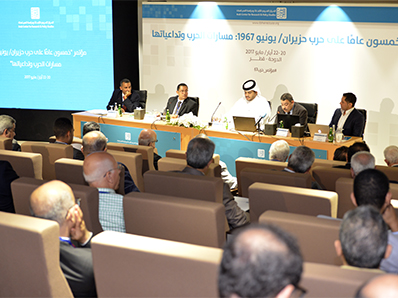Azmi Bishara, General Director of the Arab Center for Research and Policy Studies, delivered the opening lecture at “The June 1967 War: Fifty Years On” on Saturday, 20 May, 2017. In his keynote address, Bishara lamented that this three-day meeting would in fact be the first attempt in half a century to provide a robust academic critique of the events he described as “the single biggest military defeat the Arabs have known in modern history”. Bishara contrasted the dearth of Arab academic discourse on the conflict with the hundreds of books, memoirs and research papers available in Hebrew and in Western languages. These works have dissected “every single confrontation on the battlefield”, written by scholars as well as by officials, politicians and military officers with a first-hand knowledge of the events.
Analyzing the Causes of Defeat in a Watershed War
In Bishara’s own words, “June, 1967, not May, 1948 marked the real birth of the state of Israel—at the very least, it marked the point when the state could be seen to be well entrenched in the region. It was Israeli military victory in 1967 which, Bishara pointed out, had convinced not only the Zionist state but also the Diaspora Jewish community that the country was more than a mere adventure, but in fact a stable, reliable presence in the region. This accelerated Jewish migration to Israel, and also persuaded the United States of the advantages of a strategic alliance with a country it now saw as a worthwhile and dependable military ally.
Bishara went on to explain that even the Palestinian Cause was not truly defined until the watershed moment of June, 1967. It was the territories conquered by the Israelis during that conflict (with the constant exception of Jerusalem) which Tel Aviv would offer up in barter as part of a formula which saw Israel give up land in exchange for formal recognition from the surrounding Arab countries. The latter was rephrased into the Arab formula of “land for peace”.
With time, however, even this vision was fragmented and atomized. Bishara held that since the 1967 conflict, the idea of an “Arab-Israeli” conflict, has made way for a series of individual agreements tying Israel separately to Egypt, Jordan and the Palestinians. This went hand-in-hand with the decline and eventual demise of Arab nationalism as a state-sanctioned ideology. The winners were a new set of ruling regimes which never had time for Arab nationalism in the first place, and which could dress up their desire for a separate peace with Israel by claiming to not to want to intervene in Palestinian affairs. Other regimes continued to hold on to the ideal that the Palestinian Cause touched all Arabs—but only rhetorically, and only in the service of maintaining their power, fashioning Palestine into a hammer with which to beat down demands for justice and freedom within their own borders, and as a bargaining chip on the international arena.
 Here, Bishara had particular scorn for attempts within Arab public discourse to sugarcoat the bitterness. One example he used was how the military loss in 1967 was euphemistically termed a Naksa or “setback”. It was as if the “progressive” camp in the region, said Bishara, wanted to cultivate the notion that they were not forced to complete surrender, but merely had to give up some land. It was a phenomenon which, the speaker added, merited its own separate, and extensive, academic attention. When the time to eventually reckon with the scale of military defeat, Bishara identified another trend among the Arab regimes which tended to attribute near-mythical military prowess to the Israeli war machine. This allowed them to let themselves off the hook in terms of accounting for the loss, because they could not compete with a “global conspiracy” which placed America against them.
Here, Bishara had particular scorn for attempts within Arab public discourse to sugarcoat the bitterness. One example he used was how the military loss in 1967 was euphemistically termed a Naksa or “setback”. It was as if the “progressive” camp in the region, said Bishara, wanted to cultivate the notion that they were not forced to complete surrender, but merely had to give up some land. It was a phenomenon which, the speaker added, merited its own separate, and extensive, academic attention. When the time to eventually reckon with the scale of military defeat, Bishara identified another trend among the Arab regimes which tended to attribute near-mythical military prowess to the Israeli war machine. This allowed them to let themselves off the hook in terms of accounting for the loss, because they could not compete with a “global conspiracy” which placed America against them.
Meanwhile, the speaker continued, efforts by opposition movements to hold Arab governments to account for the loss were equally confused. One group of Arab intellectuals were driven to dissecting questions of the cultural imbalance, likening defeat by Israel to the kind of civilizational mismatch first evidenced by Napoleon’s conquest of Egypt. The logical conclusion which many in this group followed was enchantment with Israeli military might, expressing admiration for the Zionist state, which they saw as modern and forward-looking.
Bishara also commented on how the defeat in 1967 reverberated through the diverse ideological camps in the Arab countries, each looking for the roots of defeat in a way which affirmed their own worldview. Arab Islamists blamed the lack of religiosity among the ruling elites for defeat on the battlefield—even as Israel itself, at the time, was a secular power. Arab leftists pointed to Israel’s collectivist economy—which it abandoned eventually—as the source of its strength. Meanwhile, proponents of democracy in the region blamed the lack of democracy in the Arab states for their humiliation in war.
Yet, as Bishara pointed out, such explanations failed to account for reality on the ground. France’s democratic values did not prevent its occupation by Nazi Germany. Nor could such “ideological” arguments be used to explain victories and losses in battle throughout the twentieth century, from the Vietnam War to the Soviet triumph over Berlin. As Bishara asserted, “support for liberal democracy and social justice [should not] be rooted in their value to the war effort, but rather for their own sake, morally, because they are preferable to [subjugation].” The factors which needed to come into line for victory in a modern war, said Bishara, could be found in a variety of regimes regardless of ideology. It was time, he contended, to lay aside the sparring which reduced the defeat of the 1967 into an ideological battleground for competing Arab factions.
It was instead important to realize that military defeat in 1967 was not a foregone conclusion born of Arab “backwardness” or the like; that it could be understood by examining the breakdown in relations between Egypt and Syria; by exploring questions of Arab military preparedness. Obviously, Bishara said, the nature of Arab regimes was salient to this discussion, but it could not provide answers to every question.
The Progress of Battle: a Closer Look
“The June 1967 War: Fifty Years On” will continue to provide an academic venue for the reexamination of the “third Arab-Israeli War”. A total of eight separate panels, including a roundtable discussion on Monday made up of eyewitness accounts, will be held over the three days. Speakers were invited to explore events from the perspectives of military history and strategic analysis.
The first session to follow the keynote address was moderated by Sheikh Suhaim Al Thani, and focused on developments in the war along the Egyptian front. The first speaker was the ACRPS’ Saifeddin Abdelfattah, whose paper was titled “Understanding the Mentality of Defeat: Military Professionalism and the June 1967 War”. Abdelfattah attributed Egypt’s shocking defeat, within hours of the Israeli military attack, at least partly to infighting between various camps of officers in the Egyptian military. Omar Ashour, speaking on the same panel, also attempted to explain the factors which led to Egypt’s defeat in 1967. Despite the overwhelming numerical superiority of Arab military material, and the bombast of Gamal Abdul Nasser, Egypt was, Ashour claimed, let down by its soldiers’ lack of combat preparedness. Ultimately, on the tactical and strategic levels, the Egyptian army did not live up to its military capabilities nor to official rhetoric.
A second session shifted the focus to the Syrian front. Gen. Mohammed Haj-Ali offered an analysis of the Syrian armed forces on the eve of war in 1967. Haj-Ali suggested that the involvement of Syrian General Command in domestic political affairs distracted them from the task of defending the country’s borders. Gen. Haj-Ali went on to give a general description of the battle positions of the Syrian army across the Golan Heights before the Israeli attacks, as well as a broad outline of Damascus’ anticipated counterattacks. Gen. Haj-Ali also offered the audience a general description of the topographical features of the Golan Heights, which Israel captured in the fighting in June, 1967, and its value as a natural fortress overlooking the valleys on either side below it.

Speaking on the same panel was ACRPS Researcher Jamal Barout, whose presentation offered a survey of the dizzying series of coups and counter-coups which rocked Syria since 1947, debilitating its army and eviscerating its officer core. One example he gave was the coup of March 8, 1963, which instantly led to the dismissal of more than 700 professional officers in less than three months, replacing them with more ideologically reliable recruits conscripted from the reserves. By 1965, Barout maintained, the situation had become so bad that the Syrian Chief-of-Staff attempted to remove the Minister of Defense at gunpoint. The last series of purges by coup plotters to happen before the June 1967 war took place in February, 1966.
The third and final session of the day was devoted to studying the war played out on the Jordanian theater, and was chaired by Haider Saeed. Samir Mutawe made use of the archives of Jordan’s Royal Court and the correspondence between the King Hussein and Egyptian President Nasser, which included the conclusion of a defense pact that specified the role which Jordanian forces would play in the event of a war. The pact was joined on May 30, a mere five days before hostilities broke out. Muhanad Mubaidin offered a presentation titled “Reading the June 1967 War in Jordanian Memoirs”. He drew on material sourced from Jordanian elites and civilian and military leaders who had lived through the June 1967 war. Mubaidin offered the conclusion that the Jordanian military leadership had chosen, in the end, to live in denial of the defeat itself.
Ayman Mohamed Eid was the third speaker on the Jordanian panel, and chose to concentrate on the impact of the Iraqi force on the battlefield in 1967. Eid discussed Israel’s military that was determined to reach total self-reliance, in the view that foreign influences as the path to defeat. This drove Tel Aviv to work diligently to build its own military capabilities, particularly those of its Air Force, from the ground up. In the end, the Israelis were able to neutralize Arab air forces, especially those of Egypt and Iraq, and moot their influence on the theater of operations.
The conference will continue through Monday, 22 May. Sessions on Sunday will include “The June 1967 War: the Regional and Global Setting”; “The June 1967 War as Seen by Israel”; and “The June 1967 War: Repercussions for the Arab Region”.